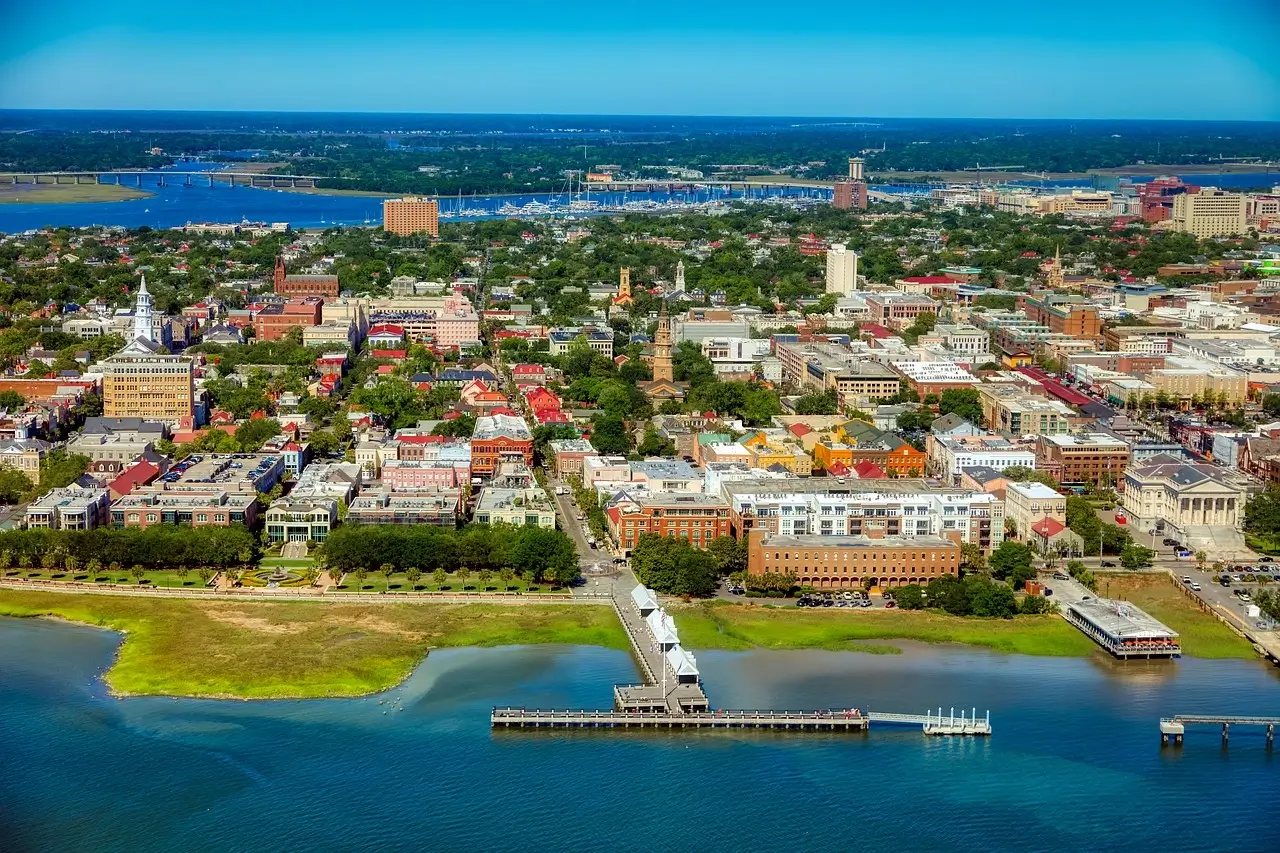Charleston, South Carolina, a city steeped in history since its founding in 1670, continues to captivate as a living testament to American heritage. From its roots as “Charles Town” honoring King Charles II of England, to its pivotal role in colonial trade driven by slave labor, Charleston’s narrative unfolds through its historic plantations and naval museums.
Main Attractions
- Magnolia Plantation and Gardens: A showcase of opulent history and lush gardens, rooted in the Drayton family’s legacy.
- Patriots Point Naval and Maritime Museum: Home to the USS Yorktown and a chronicle of naval history with interactive exhibits.
- Hunting Island State Park: Pristine beaches, nature trails, and a historic lighthouse provide a picturesque escape.
- Charleston City Market: A historical marketplace dating back to 1788, now housing micro boutiques with handmade treasures.
City Information
- Location: At the confluence of the Ashley, Cooper, and Wando rivers in South Carolina.
- Population: Growing from 150,227 in 2020 to an estimated 153,672 in 2022.
- Climate: Humid subtropical, with mild winters, hot summers, and the occasional threat of hurricanes.
- Demographics (2020): A diverse mix, with White, Black, Asian, and Hispanic communities contributing to the city’s rich cultural tapestry.
Language and Culture
- Gullah: A creole language influencing local speech, particularly among African Americans.
- Charleston Accent: A distinctive local accent, though diminishing over time.
- “The Holy City”: A nickname, possibly 20th-century in origin, reflecting Charleston’s self-satisfied attitude.
Religion and Culture
- Historical Dominance: Historically Anglican, with contributions from French Huguenots, Jews, and other communities.
- Cultural Blend: Charleston embraces a fusion of Southern, English, French, and West African cultural elements.
Spoleto Festival USA
- Annual festival founded in 1977, featuring arts, music, and performances.
- Charleston’s history, cultural diversity, and blend of historic and contemporary attractions make it a fascinating destination.

Navigating Charleston’s Future
Charleston stands at a pivotal moment, navigating a delicate dance between preserving its rich history and embracing the demands of a modern, growing city. Preserving cobblestone streets and antebellum charm while accommodating a burgeoning population poses a unique challenge in maintaining historical allure.
The transformation from a port city to a diverse economic hub necessitates careful planning to foster growth without compromising Charleston’s unique essence. Balancing modern amenities with the preservation of historic districts is a critical consideration as Charleston rapidly urbanizes.
Facing climate change and sea-level rise, leaders must make decisions that protect natural beauty and historic sites while considering economic interests. Ensuring social equity becomes paramount as Charleston grows, with decisions on affordable housing, education access, and resource distribution shaping the city’s future.
In this intricate dance of progress and preservation, community engagement emerges as a linchpin. Striking a balance between community desires and broader city interests requires thoughtful consideration and collaboration.
Charleston’s future unfolds in the hands of decision-makers facing multifaceted challenges. By prioritizing community engagement, leaders can guide Charleston toward a future that respects its past while embracing tomorrow’s possibilities. The city’s history, diversity, and attractions not only make it a destination but a testament to the delicate dance of progress and preservation. Charleston, a city woven with threads of history, development, and community, continues to script its unique narrative in the tapestry of American cities.
Conclusion
In navigating Charleston’s complex landscape, decision-makers face a myriad of challenges. Striking a balance between historical preservation and modern development, economic growth and environmental sustainability, and social equity requires careful consideration. Through prioritizing community engagement, leaders can guide Charleston towards a future that respects its past while embracing tomorrow’s possibilities. The city’s history, diversity, and attractions make it not just a destination but a living testament to the delicate dance of progress and preservation.